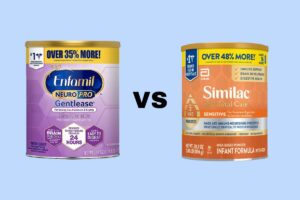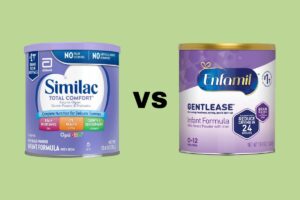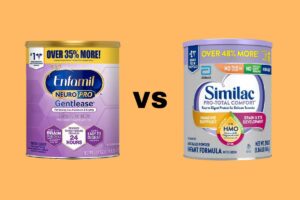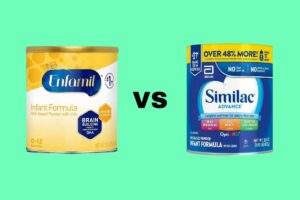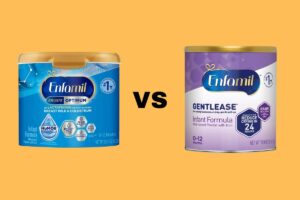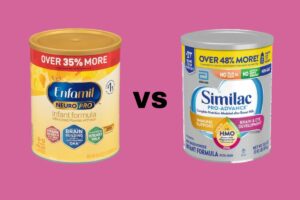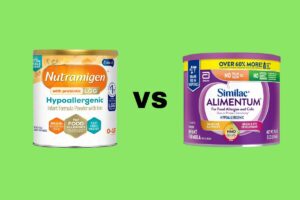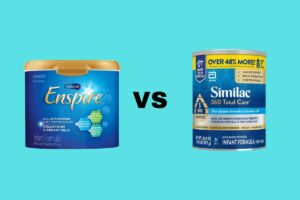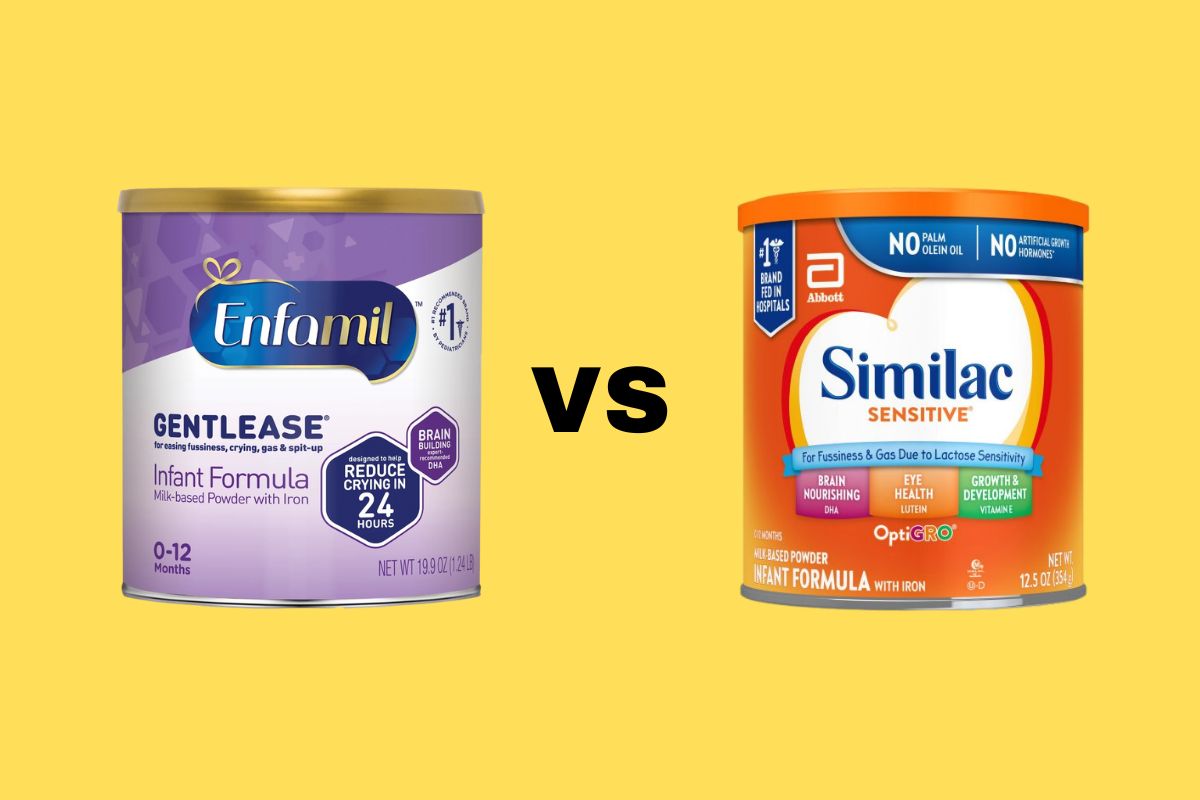
Quick Comparison
| Feature/Aspect | Enfamil Gentlease | Similac Sensitive |
|---|---|---|
| Purpose | Designed for babies with sensitive stomachs. | Designed for babies with sensitive stomachs. |
| Key Benefits | Alleviates digestive issues like fussiness and gas. | Alleviates digestive issues like fussiness and gas. |
| Ingredients | Partially hydrolyzed nonfat milk and whey protein concentrate solids. Lactose (reduced amount). Vegetable oil blend (palm olein, soy, coconut, and high oleic sunflower oils). Vitamins and minerals (including iron, calcium, and vitamins A, C, and D). | Milk protein isolate. Maltodextrin. Vegetable oil blend (palm olein, soy, coconut, and high oleic sunflower oils). Vitamins and minerals. |
| Special Features | Contains partially broken-down proteins for easier digestion. | Lactose-free, ideal for babies with lactose sensitivity. |
| Nutritional Components | Balanced blend of nutrients for overall health. | Similar blend of vitamins and minerals as Enfamil Gentlease. |
| Recommendation | Consult with a pediatrician before making any changes to the baby’s feeding routine. | Consult with a pediatrician before making any changes to the baby’s feeding routine. |
When it comes to choosing the right formula for your baby, you might be faced with a plethora of options.
Among the many infant formulas available in the market, Similac Sensitive and Enfamil Gentlease stand out as two popular choices for babies with sensitive stomachs.
Both formulas have been specifically designed to cater to the needs of infants experiencing fussiness and gas due to their sensitivity to milk-based products.
While both the Similac Sensitive and Enfamil Gentlease formulas aim to provide complete nutrition for your baby while alleviating their digestive issues, the key differences lie in the ingredients.
Similac Sensitive is lactose-free, whereas Enfamil Gentlease contains gentle proteins that are broken down to facilitate easier digestion. As a responsible parent, it is essential to understand these differences, compare the nutritional value, and assess the taste and consistency of both options to make an informed choice.
Moreover, considering the price, potential side effects, and allergy information would further assist in determining which formula is the most suitable option for your little one, keeping in mind their unique requirements and preferences.
Key Takeaways
- Similac Sensitive and Enfamil Gentlease are both designed for babies with sensitive stomachs.
- Important factors to consider include ingredients, nutritional value, and taste consistency.
- Assess the price, known side effects, and allergy information for an informed decision.
Why Choose Baby Formula
When it comes to feeding your baby, choosing a formula that caters to their unique needs is essential. Enfamil Gentlease and Similac Sensitive are two popular options that ease your baby’s digestive issues, providing much-needed relief for you and your little one.
Both formulas aim to alleviate common issues such as colic, fussiness, gas, and constipation. Enfamil Gentlease contains partially broken-down proteins, making it easier for your baby’s sensitive stomach to digest.
On the other hand, Similac Sensitive is a lactose-free option for infants who may have lactose sensitivity or intolerance, as it relies on alternative carbohydrate sources to provide the energy your baby needs.
These specialized formulas can be beneficial as your baby’s digestive system develops. Introducing a formula that targets their specific needs promotes healthy growth and ensures a more comfortable and satisfying feeding experience.
In addition to addressing digestive concerns, Enfamil Gentlease and Similac Sensitive are also fortified with vital nutrients that support your baby’s overall health. These include essential vitamins, minerals, and DHA, which contribute to brain development, immune system support, and physical growth.
Ultimately, choosing between Enfamil Gentlease and Similac Sensitive depends on your baby’s unique circumstances and sensitivities.
Remember to consult with your pediatrician before making any changes to your baby’s feeding routine, as they can provide personalized advice based on your baby’s health and needs.
With the right guidance and support, you’ll be able to make an informed choice that prioritizes your baby’s well-being.
Decoding Ingredients
When choosing between Enfamil Gentlease and Similac Sensitive for your baby, it’s essential to take a closer look at their ingredients. In this section, we’ll break down the key components of both formulas to help you make an informed decision.
Enfamil Gentlease Ingredients
Enfamil Gentlease is designed to be gentler on your baby’s stomach. Its primary ingredients include:
- Partially hydrolyzed nonfat milk and whey protein concentrate solids: This protein source is broken down into smaller pieces, making it easier for your baby to digest.
- Lactose: While not completely lactose-free, Enfamil Gentlease uses a reduced amount of lactose to minimize digestive discomfort.
- Vegetable oil blend: This blend of palm olein, soy, coconut, and high oleic sunflower oils provides essential fatty acids to support your baby’s growth and development.
- Vitamins and minerals: Enfamil Gentlease contains a balanced blend of nutrients for your baby’s overall health, including iron, calcium, and vitamins A, C, and D.
Alternatives
Similac Sensitive Ingredients
Similac Sensitive is a lactose-free formula designed for babies with sensitive stomachs. Its primary ingredients include:
- Milk protein isolate: This protein source is derived from cow’s milk and is lactose-free, making it ideal for babies with lactose sensitivity.
- Maltodextrin: Instead of lactose, Similac Sensitive uses maltodextrin as a carbohydrate source, which is easier for your baby’s stomach to process.
- Vegetable oil blend: Like Enfamil Gentlease, Similac Sensitive also contains a blend of palm olein, soy, coconut, and high oleic sunflower oils to provide essential fatty acids.
- Vitamins and minerals: Similac Sensitive offers a similar blend of vitamins and minerals as Enfamil Gentlease, ensuring your baby receives the nutrients they need for healthy growth and development.
Alternatives
Now that you have a better understanding of the ingredients in Enfamil Gentlease and Similac Sensitive, you can make an informed decision about which formula is best suited for your baby’s nutritional needs. Remember, it’s always a good idea to consult your pediatrician if you have any concerns or questions about your baby’s dietary requirements.
Comparing Nutritional Value
When comparing Enfamil Gentlease and Similac Sensitive, it’s essential to consider their nutritional value for your baby.
Enfamil Gentlease is designed to help reduce gas, fussiness, and crying in infants. It contains partially hydrolyzed nonfat milk and whey protein concentrate solids as its protein sources, which are considered gentle proteins, easier to digest for babies with sensitive stomachs.
Similac Sensitive, on the other hand, is formulated specifically for babies with lactose sensitivity. It contains a low amount of lactose (0.1 g lactose/100kcal) and uses milk protein isolate as its protein source.
Although both formulas aim to support babies with sensitive stomachs, they differ in their carbohydrate sources. Enfamil Gentlease uses corn syrup solids, while Similac Sensitive relies on maltodextrin and sugar as its main carbohydrates.
As for essential nutrients, both formulas provide the necessary vitamins and minerals to support your baby’s growth and development. Here’s a quick comparison of some key nutrients:
- Iron: Both Enfamil Gentlease and Similac Sensitive contain similar amounts of iron, crucial for your baby’s brain development and overall growth.
- DHA: Both formulas are enriched with DHA (docosahexaenoic acid), an omega-3 fatty acid crucial for your baby’s brain and eye development.
- Prebiotics: Prebiotics support a healthy gut microbiome, promoting a healthy immune system for your baby. Enfamil Gentlease includes polydextrose as a prebiotic, while Similac Sensitive contains galactooligosaccharides (GOS).
Ultimately, the choice between Enfamil Gentlease and Similac Sensitive depends on your baby’s specific needs, whether it’s a sensitivity to lactose or the need for more easily digestible proteins. Regardless, both formulas provide the essential nutrients to help your baby grow and thrive.
Understanding The Differences
When comparing Enfamil Gentlease and Similac Sensitive, it’s important to understand the key differences between these two popular infant formulas. Both formulas are designed to help babies with sensitive stomachs, but they achieve this goal in slightly different ways.
One major difference is in the lactose content. Similac Sensitive is specifically designed for babies with lactose sensitivity, containing only 0.1 g lactose/100kcal. This makes it an excellent choice if your baby is experiencing any lactose-related digestive issues.
On the other hand, Enfamil Gentlease uses broken-down lactose proteins, making it gentle on the stomach and easier for those little tummies to digest.
Another distinction lies in the source of protein. Similac Sensitive uses milk protein isolate as its primary protein source. Enfamil Gentlease, however, utilizes partially hydrolyzed nonfat milk and whey protein concentrate solids.
These gentle proteins in the Gentlease formula might be more suitable for babies who have difficulty digesting the regular proteins found in some other formulas.
Price is another factor to consider. Similac Sensitive tends to be more expensive than Enfamil Gentlease, so you might want to keep that in mind when deciding which formula is the best for your budget.
Remember to consult with your pediatrician before choosing a formula to ensure it meets your baby’s dietary needs. By understanding the differences between Enfamil Gentlease and Similac Sensitive, you’re better equipped to make an informed decision that will benefit your baby’s overall health and happiness.
Assessing the Taste and Consistency
As you evaluate Enfamil Gentlease and Similac Sensitive, one of the important factors to consider is the taste and consistency of the formula. After all, your baby’s acceptance of the formula plays a crucial role in their overall nutrition and growth.
When comparing the taste between Enfamil Gentlease and Similac Sensitive, you might notice some differences in their ingredients:
- Enfamil Gentlease uses partially hydrolyzed proteins, which are broken down into smaller pieces to be gentler on your baby’s stomach. This formula also contains a blend of carbohydrates sourced from corn syrup solids and modified corn starch.
- Similac Sensitive is a lactose-free formula, opting for maltodextrin and sugar as the main carbohydrates. This formula contains intact proteins, which might make it taste slightly different compared to Enfamil Gentlease.
Between these two formulas, some parents report that Similac Sensitive has a sweeter taste due to its sugar content, while Enfamil Gentlease may taste slightly milder.
However, it’s important to remember that each baby’s taste preferences are unique, and what might taste good to one baby may not be as appealing to another.
In terms of consistency, both Enfamil Gentlease and Similac Sensitive have fairly similar textures. Both formulas mix easily with water, which can help prevent clumps and lumps that may be difficult for your baby to swallow.
As you assess the taste and consistency of Enfamil Gentlease and Similac Sensitive, it might be helpful to try small sample sizes of each to see which one your baby seems to prefer.
By observing your baby’s reaction to each formula, you can make a more informed decision regarding their nutritional needs and preferences.
Reviewing the Price
When comparing Enfamil Gentlease and Similac Sensitive, it’s essential to consider the price as part of your decision-making process. Both brands offer various formats and sizes, which can affect the cost. Let’s break down the pricing of each formula to help you choose the right one for your budget.
Enfamil Gentlease: Enfamil Gentlease comes in different sizes and formats, including powder, ready-to-use liquid, and concentrated liquid. The prices may vary depending on where you purchase the formula, but here’s a general idea of what to expect:
- Powder: A 20.9 oz canister costs around $26 to $30.
- Ready-to-use liquid: A 32 oz bottle is typically between $8 and $10.
- Concentrated liquid: A twelve-pack of 2 fl oz bottles ranges from $12 to $15.
Keep in mind that buying in bulk or larger sizes may save you some money in the long run.
Similac Sensitive: Similac Sensitive also comes in various formats and sizes. As with Enfamil Gentlease, prices can vary depending on where you buy the formula. Here’s a general idea of the cost:
- Powder: A 22.5 oz canister is priced around $28 to $32.
- Ready-to-use liquid: A 32 oz bottle generally costs between $7 and $9.
- Concentrated liquid: An eight-pack of 2 fl oz bottles ranges from $10 to $13.
As with Enfamil Gentlease, you might save some money by purchasing larger sizes or buying in bulk.
In conclusion, both Enfamil Gentlease and Similac Sensitive have fairly similar price points, considering their respective formats and sizes. It’s essential to factor in these costs when deciding which formula is the best fit for your baby and your budget.
Keep your eyes open for sales and discounts to make the most of your money. Remember, your baby’s comfort and nutritional needs are the top priority, and the price should be considered accordingly.
Known Side Effects
Possible Enfamil Gentlease Side Effects
While Enfamil Gentlease is designed to ease gas and fussiness in babies, some infants may still experience side effects. Keep in mind, every baby is different, and their reactions may vary.
- Gas and Bloating: Some babies might still experience gas and bloating when using this formula. If your baby continues to have discomfort, consult your pediatrician for guidance.
- Constipation: While not common, your baby may experience constipation with Enfamil Gentlease. Make sure to monitor your baby’s bowel movements and consult your pediatrician if constipation persists.
Potential Similac Sensitive Side Effects
Similac Sensitive aims to reduce lactose intolerance symptoms in babies, but like with any formula, there can still be potential side effects. Here are a few to keep an eye out for:
- Lactose Intolerance Symptoms: Even though Similac Sensitive is designed for lactose-sensitive infants, some babies might still experience symptoms like gas, spit-up, and painful digestion. Remember to consult your pediatrician if these issues continue.
- Allergic Reactions: Although rare, your baby could be allergic to certain ingredients in Similac Sensitive. Watch for signs of an allergic reaction, such as hives, difficulty breathing, or swelling of the face, lips, tongue, or throat. If you suspect an allergic reaction, contact your pediatrician immediately.
Allergy Information
When it comes to choosing a formula for your baby, it’s important to consider any potential allergies or sensitivities they may have. Both Enfamil Gentlease and Similac Sensitive are designed to cater to the needs of babies with delicate digestive systems.
Let’s dive into the allergy information of both formulas to help you make the best decision for your little one.
Enfamil Gentlease is designed with partially hydrolyzed proteins, which means the proteins are broken down into smaller pieces. This makes it easier for your baby’s digestive system to process and may help reduce the risk of allergic reactions.
The formula also features a reduced level of lactose, which can be beneficial for babies who are sensitive to lactose but not completely lactose intolerant.
On the other hand, Similac Sensitive is a lactose-free formula. This means it does not contain any lactose, making it an ideal choice for babies who are lactose intolerant or who have difficulty digesting lactose. Instead of lactose, Similac Sensitive uses a different carbohydrate source to provide your baby with the necessary nutrients needed for growth and development.
Here is a comparison of the allergy aspects of both formulas:
- Enfamil Gentlease:
- Partially hydrolyzed proteins
- Reduced lactose (not completely lactose-free)
- Similac Sensitive:
- Lactose-free formula
- Different carbohydrate source
Both Enfamil Gentlease and Similac Sensitive aim to provide the necessary nutrients for your baby while being gentle on their digestive system.
When deciding between the two, consider factors such as lactose intolerance or sensitivity, and consult with your pediatrician to determine which formula is best suited for your baby’s nutritional needs.
Remember, each baby is unique, and their needs may change over time, so always be prepared to adjust as necessary.
Conclusion
When it comes to choosing a baby formula for your little one, both Enfamil Gentlease and Similac Sensitive have their advantages. Ultimately, you’ll want to consider factors such as your baby’s specific needs, your budget, and personal preferences to determine which one might be the best option for you and your baby.
Enfamil Gentlease has been praised for its reduced lactose content, which can be beneficial for babies who struggle with lactose digestion. It also boasts a unique protein blend that is gentle on sensitive stomachs.
On the other hand, Similac Sensitive is a completely lactose-free formula designed specifically for babies with lactose intolerance. It also includes broken-down proteins to make digestion easier for your little one.
It’s worth noting that both formulas are meant to provide complete nutrition for your baby, ensuring proper growth and development.
You might want to take a close look at the list of ingredients, nutrition, and any distinct additives in each formula to identify what suits your baby’s requirements.
Remember that neither Enfamil Gentlease nor Similac Sensitive is a one-size-fits-all solution. If your baby has specific concerns such as allergies, you should consult with your pediatrician or healthcare provider before choosing a formula.
They can help advise you on the best course of action and might recommend trying one of the options to see how your baby reacts.
In conclusion, your decision between Enfamil Gentlease and Similac Sensitive comes down to your baby’s individual needs and your personal preferences. Both options have their own merits, and with a little trial and error, you’ll discover what works best for your baby’s unique situation.
Good luck in your search for the right baby formula—and remember, you’re doing a great job as a parent!
Frequently Asked Questions
What are the main differences between Enfamil Gentlease and Similac Sensitive?
Enfamil Gentlease and Similac Sensitive are both designed for babies with sensitive stomachs. The main difference lies in the lactose content: Similac Sensitive is completely lactose-free, while Enfamil Gentlease contains reduced lactose levels.
Which one is closer to breast milk: Enfamil Gentlease or Similac Sensitive?
Both Enfamil Gentlease and Similac Sensitive aim to provide complete nutrition for your baby, similar to breast milk. Each brand has its unique blend of nutrients, but neither can be definitively labeled as closer to breast milk than the other.
Is it safe to switch between Enfamil Gentlease and Similac Sensitive?
If your baby has a sensitive stomach, it is generally advised to stick to one formula brand to avoid upsetting their digestion. However, if you want to switch, consult your pediatrician, and they can guide you on the best approach to make a smooth transition.
Are there any specific benefits of using Enfamil Gentlease over Similac Sensitive?
Enfamil Gentlease contains reduced lactose levels, which can help minimize gas and fussiness in some babies, while still providing some lactose for those who can tolerate it. Similac Sensitive, being lactose-free, may be more suitable for babies with lactose intolerance.
What do parents’ reviews say about Enfamil Gentlease and Similac Sensitive?
Parents’ reviews for both Enfamil Gentlease and Similac Sensitive are mixed, as each baby is unique and may respond differently to different formulas. Some parents find Enfamil Gentlease more effective in reducing gas, while others prefer Similac Sensitive for their baby’s specific needs. It’s best to discuss your baby’s situation with a pediatrician who can provide personalized advice based on your baby’s needs.
Is there lactose in Similac Sensitive as well as Enfamil Gentlease?
No, Similac Sensitive is lactose-free. Enfamil Gentlease, on the other hand, contains reduced levels of lactose compared to regular formulas. This difference in lactose content contributes to the primary distinction between these two formulas specifically designed for sensitive stomachs.

Carly Link, a 33-year old mother of two toddlers. She is a parent and goes through a lot of the usual parenting difficulties herself. Carly shares all her experiences and knowledge about the best baby products through this blog.
